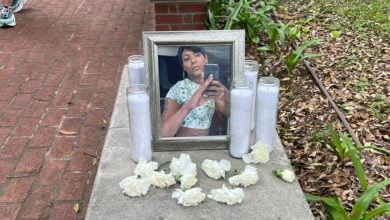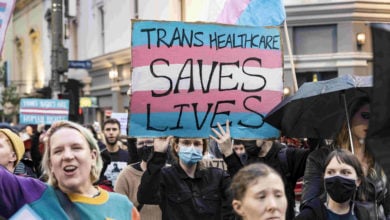The recent death of transgender teen Leelah Alcorn has sparked discussion about the need to “fix society,” in the words she used in her tragic suicide note. Her story is one that is all too common for girls like her who struggle to find acceptance among family members, friends, teachers, and of course society in general.
Her family refused to accept her for who she was, forced her into so-called Christian “conversion therapy,” and even pulled her from school and isolated her from her friends for long periods of time. Even after her death, her mother continues to misgender Leelah by using the wrong name and pronouns. But as cruel as her family may seem, they are a symptom of a much larger issue—that being the society we live in, a society which treats trans people as second class, as sexual objects, and ultimately as disposable beings.
Living as a trans person isn’t easy. Our families, who we might rely on for support, may be ignorant about the issues we face, or even hostile towards us. Medical professionals may not be educated about us, making visits to the hospital or clinic uncomfortable at best. Even walking outside can be dangerous as reactions vary from catcalling, being laughed at, to threats of violence that could escalate at any moment.
“The only way I will rest in peace is if one day transgender people aren’t treated the way I was, they’re treated like humans, with valid feelings and human rights,” Leelah wrote. As fighters for trans liberation, it is our duty to make that dream of a better future the reality of our present. But what are the concrete ways in which we can do that right now?
Leelah offered some ideas, such as teaching about gender in schools. Schools are often the battleground where trans students are denied access to the bathroom or the sports teams that matches their identity, even despite the U.S. Department of Education’s guidelines, which explicitly state that trans students are protected from sex-based discrimination under Title IX. Conservatives have often used fear mongering to try and block such protections, arguing that this would protect mischievous children who might claim to be “trans for a day.” And yet that very misconception—that one could be “trans for a day”—underlines the need for education about gender in schools.
Gender education
Gender is not binary—it is not either/or—and yet we’re taught from the moment we are born that there are boys and there are girls, and as we grow up we learn to differentiate the two based on certain physical characteristics. The reality is that human bodies are diverse, and people have about as many ways of identifying themselves as there are people existing in the world.
Some people are cisgender—meaning the sex they were assigned at birth (male or female) is the sex that they feel comfortable being identified as. Some people are intersex, meaning they cannot be classified as clearly male or female because their bodies may have attributes of both, or lack some characteristics considered necessary to be defined as one or the other. And still others identify as transgender, which is an umbrella term denoting a person whose gender identity does not align with the sex they were assigned at birth.
Educating people on the diversity of gender could allow us to move beyond mere tolerance and into acceptance and even appreciation for the multitudes of gender identities and expressions. Or in the words of Leslie Feinberg, “We have a right to live openly and proudly … where our lives are suppressed, everyone is denied an understanding of the rich diversity of sex and gender expression and experience that exist in human society.”
We need laws protecting us so that we may live openly and proudly. We need laws that recognize anti-trans violence as hate crimes in every state. We need laws such as the proposed Leelah’s law that seeks to put a stop to Christian “conversion therapy.”
We need better access to health care such as mental health care and trans health care, as well as knowledgeable medical professionals. In Cuba, trans specific health care—like all health care in that country—is completely covered.
We need to change so much, but we should also recognize that society will never change unless we use our voices to raise awareness and demand change.
Promises made to Leelah at New Haven Justice for Jane vigil
At a vigil that took place in New Haven, Conn., on Jan. 10 hosted by Justice for Jane, Leelah was memorialized through promises to her. The following are selected quotes from the vigil:
“I want to make a promise that I will keep fighting for our community, no matter how hard the struggle gets. Jane is 17 just like you, Leelah. I promise to fight to make sure she lives the life you deserved, and to fight for all young people who are being abused like you and Jane. We will keep the struggle alive for you, and we will tear down the system that took your life, keeps our community down and discourages us from living.”
—IV, Party for Socialism and Liberation/J4J
“We need to fight to end conversion therapy, but I have little faith that the state will enforce a law against it.”
—Erika, vigil co-organizer
“I’m a Native American person, and I pledge to give my solidarity to all Two-Spirit people. I promise to keep fighting. We can gather here today, tomorrow, next week, every month, but if we don’t make a commitment, each of us, in our hearts, to be out there at all times, fighting to tear down this system, people will keep dying and we will keep having to have vigils.”
—Norman, PSL
“I promise to continue learning about the struggles the trans community faces and educate others about them. I promise to stay in the streets fighting for you all.”
—Justin, PSL
On Dec. 28, 2014, we lost a beautiful human being, full of potential. “My death needs to mean something,” she said. Let’s fulfill that hope; let’s fix society by dreaming of—and demanding—a better one.





